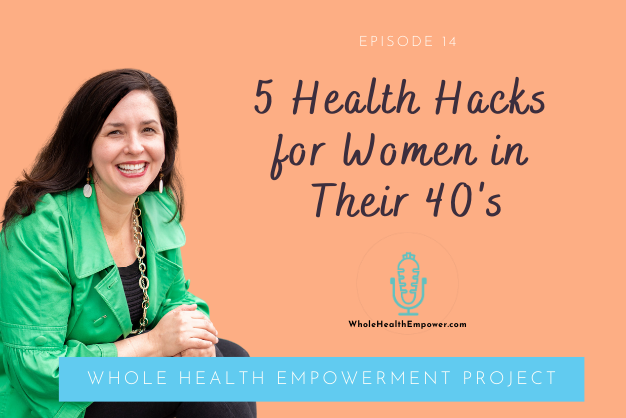In this episode, we discuss 5 health hacks for women in their 40’s.
As we start to move through our 40’s, our bodies are starting to change. We may be carrying more weight around than we like, feel exhausted by the demands of motherhood and now even more so with this virtual schooling we are doing, or just chronically overwhelmed. Today we will talk about changes we make today in our 40’s that can preserve our health as you move into your 50’s. We will focus on themes such as getting more sleep, avoiding dehydration, boosting energy levels, maintaining bone mass, and focusing on eye health.
Episode Resources:
5 Health Hacks for 40-year-old women
By: Tricia Stefankiewicz, MA RD
As we start to move through our 40’s, our bodies are starting to change. We may be carrying more weight around than we like, feel exhausted by the demands of motherhood and now even more so with this virtual schooling we are doing, or just chronically overwhelmed. Today we will talk about changes we make today in our 40’s that can preserve our health as you move into your 50’s. We will focus on themes such as getting more sleep, avoiding dehydration, boosting energy levels, maintaining bone mass, and focusing on eye health.
Get More Sleep
Sleep helps increase concentration and focus as well as our decision-making ability. In general, sleep aids in being able to perform tasks better than when we have no sleep at all. Most of us know what happens when we don’t sleep enough: we feel irritable, have a difficult time concentrating, making decisions, performing new tasks, and overall, we are at an increased risk of getting sick. Typical adults require anywhere from 7-9 hours of sleep at night. But there are some things we CAN do to make sleeping more of a possibility for all of us no matter how crazy and difficult life can feel.
- Establish a comfortable sleep environment: dark room, cool temperature, minimal noise
- Have a consistent night-time routine: This can include something like washing your face, brushing your teeth, taking off your makeup, put on your PJ’s, being in bed by a certain time
- Establish wind down time: read a book, journal, meditate, stretch. This can be any practice that helps you start to relax as you start to get into the sleep mindset.
- PUT all electronics away at least an hour before you go to sleep
- Avoid sleep cycle disruptors in the evening such as caffeine, alcohol, nicotine
Avoid Becoming Dehydrated
An adult body is made up of at least 50-60% of water. Water is required for every cell, tissue, and organ to function. Water helps regulate temperature, rid the body of waste, and transport essential nutrients into cells, so they work properly. It aids in digestion and helps give skin a healthy glow. The daily amount required varies according to age, gender, weight, and overall lifestyle. Typically, the more you weigh the more water you need. For instance, if you are 125 lbs., you may only require 7 cups of water per day but if you weigh 225 lbs. you may require closer to 10-11 cups of water per day. Required daily water intake varies according to the individual. Factors that increase the amount of water you need include excessive or prolonged physical activity, hot temperatures, high altitude, fever, and diarrhea. Signs that you are not drinking enough water or are dehydrated include dry mouth, dark colored urine, dizziness, intense thirst, and fatigue.
The best way to know if you are drinking enough water for your body and lifestyle is to check your urine. You want it to be paler or clearer in color. If you have dark amber urine and are feeling thirsty, you may not be drinking enough water for your body. It’s important to find the right amount that your need, because it is possible to drink too much water which is extremely dangerous.
How do we avoid becoming dehydrated?
- Explore beverages such as bottled and sparkling water or zero calorie beverages (Crystal Light)
- Add fun things to water to make it more delicious such as: lemon, lime, mint, cucumber, oranges, or use a fruit infused water pitcher
- Alternate water with caffeinated beverages like tea, coffee, and soda. For each caffeinated beverage consumed, add a water beverage after
- Drink water before, during, and after exercise. It is important to replace fluid lost with physical activity. The more intense and prolonged the exercise is, the more water you may require.
Boost Energy Levels
We have all likely experienced that mid-day slump when we suddenly feel exhausted and fatigued. We may feel like we desperately need to take a nap, but we still have a full night ahead filled with dinner making, washing dishes, and meal prepping for the next day. However, there are some things we can do to ease the mid-day fatigue we experience.
- Avoid large meals for lunch, especially ones that are high carbohydrate and loaded with fat as these typically cause energy levels to drop. This may look like a meal you have eaten out. Instead choose smaller meals and snacks eaten throughout the day to help maintain energy levels
- Snack on fruits and veggies throughout the day. These are ideal as they contain fiber which causes us to feel full longer and helps us maintain our blood sugar levels.
- Avoid becoming dehydrated which can lead to headaches and overall fatigue (see above)
- Engage in in regular physical activity or take a mid- day walk
Maintain Bone Mass
By the age of 30, your bones will be as strong as they ever will be, this is called Peak bone mass. Peak bone mass occurs in early adulthood. By the time we are in our 40’s we slowly start to lose bone mass. As we age to 50, and menopause strikes, bone loss becomes much greater. This is because after menopause, we have lower estrogen which causes higher bone loss. Some research suggests that within 5-7 years of menopause, we can lose 20% of our total bone density. This is important because as we age and lose bone density, we are at risk for developing osteoporosis and broken bones. Lifestyle factors that contribute to poor bone health include poor diet, lack of exercise, drinking excessive alcohol (3 drinks per day), too much caffeine or dark colored cola drinks. How can we maintain the bone mass we already have:
- Get enough calcium and vitamin D
- Women under the age of 50 require 1,000 mg of calcium & 400-800 IUs of vitamin D daily. Vitamin D is important as it helps absorb the calcium consumed. You are likely getting some calcium and vitamin D from the multi-vitamin you are taking but may also need to eat enough calcium and vitamin D in your diet.
- Calcium rich food items include milk products (cheese, yogurt), and other non-milk sources such as green leafy veggies and sardines
- Vitamin D food sources include fatty fish (salmon, tuna, mackerel), fortified milk products and cereals. Other sources of vitamin D include sunlight exposure in summer months. Those at risk for vitamin D deficiency include women who avoid the sun, wear excessive sunscreen, are obese, or live in a location with seasons of less sun light.
- Increase weight bearing activity. Bones get stronger as you work them. Weight bearing activities are done when your body works against gravity. Examples include fast walking, jogging, dancing, and going up the stairs.
Focus on Eye health
As we reach our 40’s we may notice that we start to squint, have a harder time reading small print, see floaters in our vision, or have much dryer eyes. We may start to be diagnosed with conditions associated with affecting eye health like high blood pressure or diabetes. Most of us are constantly on our computer, smart phone, or tablet, some suggesting even 5 hours per day. Over time, the blue light omitted from these electronics with prolonged screen time, and being closer to our screens, can cause harm to our eyes. What are some things we can do to help maintain eye health?
- Limit screen time by having no phone zones, avoiding phones and TV at mealtimes
- Eat foods such as fish, nuts and legumes, antioxidants such as vitamin C, leafy greens (which help filter blue light), carrots, and sweet potatoes
- Exercise!!!! Exercise helps circulate blood flow to your cells including your eyes
- Wear sunglasses all the time, even in the winter
- Schedule regular eye exams
In summary, you may notice some overlapping themes like limiting screen time, good nutrition, and regular exercise which are all beneficial in maintaining health as we age. Like any behavior change, start small and practice consistently. Taking any kind of action is better than taking no action. Remember to start where you’re at with tiny consistent changes. It’s not about being perfect, it’s about being 1% better each day.

